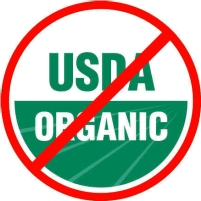Federal Government Allows more than 250 Nonorganic Substances to be Added to “Organic” Foods
Tuesday, July 10, 2012

More than 40 years since organic foods began as mom-and-pop operations, the multi-billion dollar movement that has transformed into Big Organic has lost much of its “organic” quality.
The National Organic Standards Board (NOSB), which, as a program within the Agricultural Marketing Service, maintains a list of approved organic ingredients, has gradually allowed nonorganic fillers and other foods to be added to certified goods.
Only 10 years ago, the National List had 77 nonorganic substances on it. Today, the number has climbed to more than 250.
The nonorganic ingredients include carrageenan, a seaweed-based thickener which has been linked to gastrointestinal inflammation, and synthetic inositol, which is chemically manufactured. Also on the acceptable list are docosahexzenoic acid algae oil, or DHA, and arachidonic acid single cell oil, or ARA. Six of the fifteen NOSB members actually voted to accept ammonium nonanoate, a herbicide, as an acceptable ingredient to organic foods.
Perhaps it is just a coincidence, but at the same time that the list has become corrupted, large food manufacturers have moved in and taken over many organic brands.
Bear Naked, Wholesome & Hearty, and Kashi are owned by Kellogg. PepsiCo owns Naked Juice, and Hain Celestial, once part of the Heinz empire, controls Walnut Acres, Healthy Valley, and Spectrum Organics.
As for the composition of the NOSB, four of the seats are supposed to go to organic farmers. Yet last year Secretary of Agriculture Tom Vilsack insisted that one of those seats go to Carmela Beck, who doesn’t own or operate a farm, but is rather the organic manager for the agribusiness firm Driscoll’s.
-Noel Brinkerhoff, David Wallechinsky
To Learn More:
Has ‘Organic’ Been Oversized? (by Stephanie Strom, New York Times)
Whole Foods Accused of Accepting Genetically Modified Foods (by Noel Brinkerhoff and David Wallechinsky, AllGov)
The Organic Watergate—White Paper: Connecting the Dots: Corporate Influence at the USDA’s National Organic Program (Cornucopia Institute) (pdf)
- Top Stories
- Unusual News
- Where is the Money Going?
- Controversies
- U.S. and the World
- Appointments and Resignations
- Latest News
- Musk and Trump Fire Members of Congress
- Trump Calls for Violent Street Demonstrations Against Himself
- Trump Changes Name of Republican Party
- The 2024 Election By the Numbers
- Bashar al-Assad—The Fall of a Rabid AntiSemite





Comments
moreless